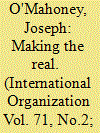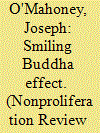| Srl | Item |
| 1 |
ID:
132052


|
|
|
|
|
| Publication |
2014.
|
| Summary/Abstract |
What explains the global variation in laws criminalizing homosexual conduct? Recent research has claimed that British colonialism is largely responsible for the criminalization of homosexuality around the world. This article utilizes a newly constructed dataset that includes up-to-date data on 185 countries to assess this claim. We find that British colonies are much more likely to have criminalization of homosexual conduct laws than other colonies or other states in general. This result holds after controlling for other variables that might be expected to influence the likelihood of repressive lesbian, gay, bisexual and transgender (LGBT) rights legislation. However, we also find that the evidence in favour of the claim that British imperialism 'poisoned' societies against homosexuality is weak. British colonies do not systematically take longer to decriminalize homosexual conduct than other European colonies.
|
|
|
|
|
|
|
|
|
|
|
|
|
|
|
|
| 2 |
ID:
153605


|
|
|
|
|
| Summary/Abstract |
Do normative arguments change what political actors do and if so, how? Rather than using the pure force of abstract moral reasoning, states often try to move the locus of contestation to an arena where they can make practical progress—the evidence or the empirical facts in support of their argument. This paper analyzes how states try to bolster their position first by constructing an argument in which an action represents part of their argument and then by performing that action to make the argument seem more convincing. I call this mechanism rhetorical adduction. The paper challenges theories of communication that deny a causal role to the content of normative arguments and diverges from a leading view on argumentation that arguments have their effects through persuasion. Integrating strategic argumentation theory with theory from psychology about how people make choices based on compelling reasons rather than cost-benefit analysis, I also use theory from sociology on how people resolve morally complex situations through the performance of “reality tests.” I illustrate the mechanism using a case from the Indo-Pakistani war of 1971 when initial resistance to recognizing the putative state of Bangladesh after India's invasion of East Pakistan was reversed as a result of an argument that Indian troop withdrawal meant that international norms were not violated.
|
|
|
|
|
|
|
|
|
|
|
|
|
|
|
|
| 3 |
ID:
185993


|
|
|
|
|
| Summary/Abstract |
We introduce “antifragility” as a conceptual framework to understand the impact of occasional violations of regime norms on the health of respective regimes. Contrary to the prevailing understanding of norm violation as a strictly negative phenomenon that leaves regimes damaged, we show that normative deviance is, under certain conditions, a stressor that helps predominantly antifragile systems learn, improve, and adapt to changes in both internal and external environments. We apply this conceptual framework to the case of the NPT regime and the prominent violations of its nonproliferation norms by India in the 1970s (as a “contestation from outside”) and Iraq in the 1990s (as a “contestation from within”). Our findings question the prevailing catastrophizing narrative about the strictly negative impact of norm violations on regime stability and contribute to contemporary scholarly debates about norm dynamics within the NPT.
|
|
|
|
|
|
|
|
|
|
|
|
|
|
|
|
| 4 |
ID:
182646


|
|
|
|
|
| Summary/Abstract |
The Treaty on the Non-Proliferation of Nuclear Weapons (NPT) faced a serious threat only a few years after it came into force in 1970. India’s “peaceful nuclear explosion” (PNE) in May 1974 rocked the nuclear-nonproliferation regime and cast doubt on the prospects of the NPT. Yet during the two years following the PNE, several significant countries ratified the treaty. Why did states that had been notable holdouts, like Italy, Japan, and South Korea, ratify the treaty soon after the Indian nuclear test? This article finds that the PNE galvanized pro-NPT forces in the United States and Canada, leading to changes in nonproliferation policy. In particular, it led them to threaten to withhold access to nuclear technology and materials unless the holdouts ratified the NPT. It also motivated Secretary of State Henry Kissinger to change his secret advice to Japan that the United States did not want Japan to ratify the NPT in order to keep the People’s Republic of China unsure about Japan’s nuclear intentions.
|
|
|
|
|
|
|
|
|
|
|
|
|
|
|
|